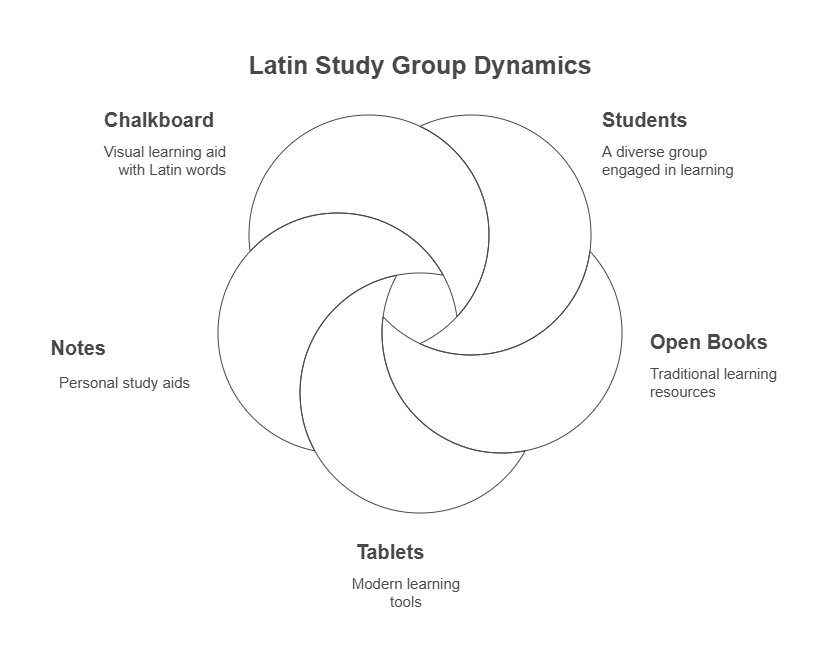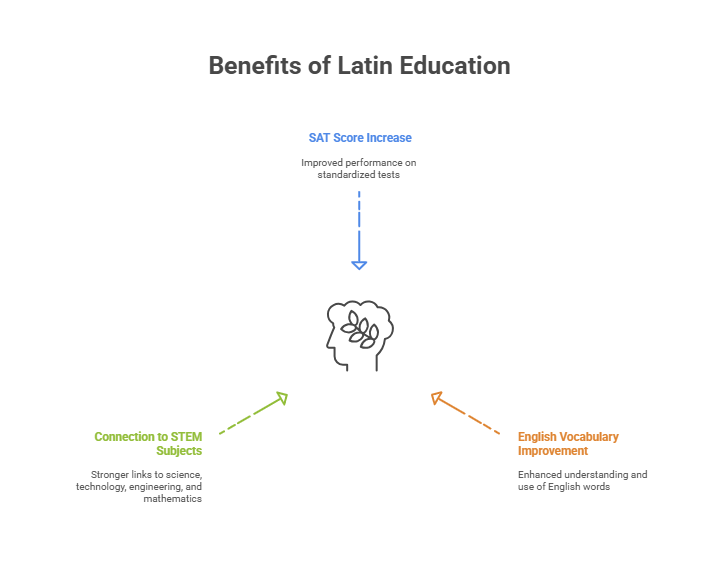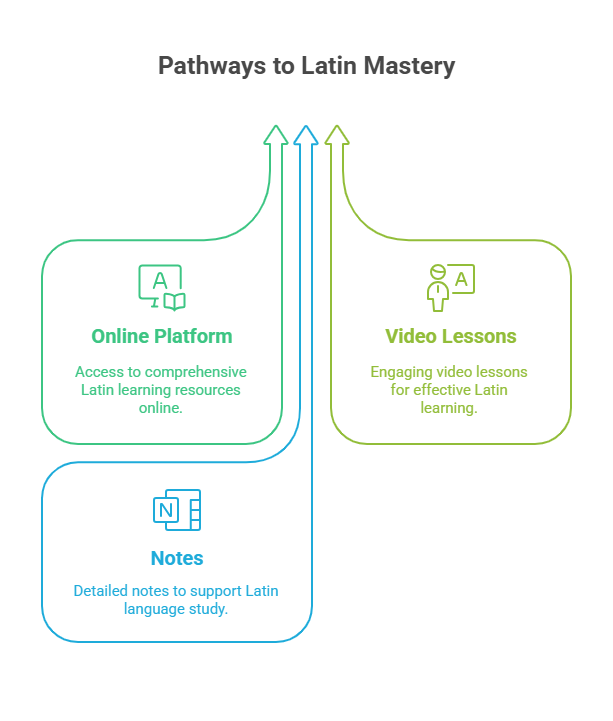How to start learning Latin can feel confusing if you’ve never studied an ancient language before. Many students and educators around the world aren’t sure where to begin or what to expect from a Beginner Latin Course. You might wonder if it’s too hard or too different from modern languages.
As the founder of LatinPerDiem, I’ve helped thousands of learners take their first steps in Latin. The problem isn’t just the grammar—it’s not knowing how Latin fits into your studies or classroom goals. That’s where the real frustration begins.
In this article, I’ll walk you through what a Beginner Latin Course looks like, step by step. You’ll learn what topics are covered, how we teach them, and what tools can help you succeed. Whether you’re teaching or learning, this guide will help you feel ready and confident to begin.
Key Takeaways:
- Learn the Basics with Ease
Start with grammar, pronunciation, and vocabulary — no prior knowledge needed. - Short, Clear Video Lessons
LatinPerDiem uses 5–10 minute videos to keep learning simple and steady. - Daily Practice Builds Skill
Just 10–15 minutes a day leads to strong progress over time. - Latin Boosts Other Subjects
Helps with English, history, and other languages like Spanish or French. - Avoid Common Mistakes
Focus on structure, not just memorizing — and listen to spoken Latin too. - Expert-Led, Flexible Learning
Taught by experienced scholars, designed for busy learners and educators. - Free Resources Available
Access daily emails, grammar videos, and Latin readings without buying textbooks.
What Can You Expect in a Beginner Latin Course?
A Beginner Latin Course teaches the basic building blocks of the Latin language. You’ll learn grammar rules, simple vocabulary, and how to read and pronounce Latin words. At LatinPerDiem, the lessons are short, clear, and designed for busy students and educators. With just 10–15 minutes a day, you can build a strong foundation in Latin and start reading real texts.
Facts & Research: Why a Beginner Latin Course Still Matters Today
Latin is far from a “dead” language—modern data and expert insight show its ongoing value. A well-designed Beginner Latin Course provides not only language instruction but also strengthens mental skills and academic performance. Below are real-world stats, studies, and expert views that highlight Latin’s benefits for students and educators.
Key Statistics & Studies
| Insight | Details & Source |
| Higher Verbal Scores | Students studying Latin scored an average of 160 points higher on the verbal portion of the SAT. (National Committee for Latin and Greek, 2018) |
| Boosts Vocabulary | 60% of English words have Latin roots; understanding Latin improves vocabulary and reading comprehension. (Oxford English Dictionary) |
| Better in STEM | Latin students often outperform peers in logic-based subjects like math and science. (The Classical Association, UK) |
| Language Learning Advantage | Learning Latin improves success rates in learning Romance languages like Spanish, French, and Italian. (American Classical League, 2021) |
Why Learn Latin in Today’s World?
Latin may be an ancient language, but its benefits are surprisingly modern. Students and educators around the world are rediscovering how Latin builds skills that go far beyond reading old texts. A Beginner Latin Course can sharpen your mind, deepen your cultural understanding, and even improve your performance in other subjects.
It Sharpens the Mind
Latin is a highly structured language. Learning it trains your brain to spot patterns, think logically, and solve problems step by step. These are skills that carry over into math, coding, and scientific thinking.
It Connects You with History and Literature
With Latin, you can read the original words of writers like Cicero, Vergil, and Augustine. You experience history and classic literature without relying on someone else’s translation, giving you a deeper and more personal connection to the past.
It Supports Other Studies
Latin improves your English by teaching you root words, prefixes, and grammar patterns. It also makes learning Romance languages like Spanish, French, and Italian much easier.
“Latin trains the mind to think rigorously. It’s not just about words—it’s about discipline and clarity.” — Dr. David Noe, Founder of LatinPerDiem”
How to Get Started with LatinPerDiem
Starting a Beginner Latin Course might feel overwhelming, but LatinPerDiem makes the first step simple. Our platform is designed to help new learners build skills in a clear, flexible way—perfect for busy students, educators, or lifelong learners.
Choose Your Starting Point
Visit LatinPerDiem.com and explore our beginner-friendly paths. Start with our daily Latin video lessons, short grammar intros, or guided reading series. Each video is only a few minutes long and walks you through Latin step by step, from pronunciation to sentence structure.
Follow a Steady Routine
Aim for just 10–15 minutes a day. Consistent practice builds strong habits and real understanding. You don’t need to cram—just take one small step daily. Many learners find success by watching one video lesson each morning.
Let Latin Be Part of Your Daily Life
Reinforce your learning with simple tools. Use flashcards to remember vocabulary, repeat out loud for Latin pronunciation practice, and read short Latin passages to build confidence. Keep it light, fun, and regular.
By following these steps, you’ll see steady progress. LatinPerDiem gives you the support, structure, and encouragement to grow at your own pace—no textbooks or prior experience required.
Mistakes Latin Beginners Often Make (and How to Avoid Them)
Starting a Beginner Latin Course is exciting, but many learners hit roadblocks by making common mistakes. The good news? These are easy to fix with the right approach.
Mistake 1: Thinking Latin Is Just Memorization
Many beginners try to memorize long vocabulary lists. But Latin is not just about words—it’s about structure. Understanding how Latin works as a system (like noun cases and verb endings) will help you read and translate more clearly.
Mistake 2: Skipping Grammar Foundations
Jumping into texts too quickly without a grammar base leads to frustration. Start with the building blocks, like declensions and conjugations, before trying full sentences.
Mistake 3: Ignoring the Audio
Latin is a written and spoken language. Hearing it helps you absorb pronunciation, rhythm, and flow. LatinPerDiem’s daily videos include spoken Latin to support both reading and listening skills.
Avoid these pitfalls by using LatinPerDiem’s structured video lessons and daily audio support. With steady practice and the right foundation, you’ll move from confused to confident in no time.
What Makes LatinPerDiem Different
Not all Latin programs are created equal — and that’s where LatinPerDiem stands apart. Our lessons are taught by classically trained scholars with decades of experience in teaching Latin at both academic and personal levels. You’re not just watching a video — you’re learning from someone who lives and breathes the language.
Our approach is personalized and practical. Lessons are delivered in short, focused videos that fit into your day — whether you’re a busy professional, a homeschooling parent, or a lifelong learner starting from scratch. Each lesson targets one concept at a time, so you’re never overwhelmed.
What really makes us different? We respect both academic rigor and your time. We believe in teaching Latin the right way — clearly, consistently, and accessibly — without requiring expensive textbooks or hours of study each day.
“Dr. Noe’s daily videos gave me the confidence to return to Latin after years away.” — LatinPerDiem Student”
This is Latin that fits your life — serious learning in a simple format, guided by experts who care about your progress.
Tools and Resources You’ll Use at LatinPerDiem
At LatinPerDiem, we give you everything you need to start strong — without extra cost or confusion. Our tools are designed for beginners and built around real progress, not busywork.
You’ll get bite-sized video lessons that break down grammar, vocabulary, and translation one step at a time. Our Latin text walkthroughs show you how to read and understand real Latin passages, even early on.
Need a grammar Improve? Try our explanation series, where we simplify complex ideas into clear, short segments. Plus, we send a free daily Latin email with a new reading and mini-lesson to keep your skills growing — no stress, just steady progress.
Beginner Latin Class Syllabus (What You’ll Learn First)
Starting a Beginner Latin Course with LatinPerDiem means building strong, clear foundations. Our lessons begin with the intro to noun declensions, which help you understand how Latin nouns change based on use in a sentence. You’ll also learn basic verb conjugations — the key to forming and understanding actions in Latin.
We focus on common vocabulary, including everyday verbs, nouns, and prepositions, to help you start reading and translating simple phrases. You’ll quickly move on to simple sentence translation, using the tools you’ve just learned.
What makes it exciting? You’ll get to practice with real Latin texts from day one — even if just a few words. It’s learning by doing, and it works.
Conclusion
Learning Latin doesn’t have to be hard or overwhelming. With LatinPerDiem, you get structured, flexible, and inspiring instruction that fits into your daily life. Whether you’re a student, teacher, or lifelong learner, you can start with no background at all. Our bite-sized videos and expert guidance make Latin clear and approachable.
Frequently Asked Questions (FAQ)
How long does it take to complete a beginner Latin course?
It depends on your pace. With LatinPerDiem, many learners feel confident after just 10–15 minutes a day for a few months. Our flexible format fits busy schedules and encourages steady progress.
Can I really learn Latin online without a teacher?
Yes. At LatinPerDiem, our expert video lessons, guided readings, and daily emails make it easy to learn Latin completely online. You don’t need a classroom or textbook—just consistency and curiosity.
Do I need to know grammar before starting Latin?
No. Our Beginner Latin Course starts from scratch. You’ll learn grammar step-by-step with clear explanations and examples, so no background knowledge is required.
Is Latin still useful today, or is it a dead language?
Latin is not spoken conversationally, but it’s very much alive in education, law, medicine, and theology. It also helps improve English vocabulary and boosts learning of other Romance languages.
What’s the best way to stay motivated when learning Latin?
Start small and stay steady. Use our short daily videos, try flashcards, and enjoy the challenge of reading real Latin texts. Celebrate little wins, and let Latin become part of your daily rhythm.




